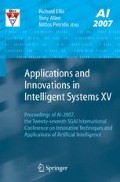Abstract
Acquiring case representations from textual sources remains an interesting challenge for CBR research. Approaches based on methods in information retrieval require large amounts of data and typically result in knowledge-poor representations. The costs become prohibitive if an expert is engaged to manually craft cases or hand tag documents for learning. Thus there is a need for tools that automatically create knowledge-rich case representations from textual sources without the need to access large volumes of tagged data. Hierarchically structured case representations allow for comparison at different levels of specificity thus resulting in more effective retrieval than can be achieved with a fiat structure. In this paper, we present a novel method for automatically creating, hierarchically structured, knowledge-rich cases from textual reports in the Smart-House domain. Our system, SMART, uses a set of anchors to highlight key phrases in the reports. The key phrases are then used to learn a hierarchically structured case representation onto which reports are mapped to create the corresponding structured cases. SMART does not require large sets of tagged data for learning, and the concepts in the case representation are interpretable, allowing for expert refinement of knowledge.
Access this chapter
Tax calculation will be finalised at checkout
Purchases are for personal use only
Preview
Unable to display preview. Download preview PDF.
References
A. Aamodt and E. Plaza. Case-based reasoning: Foundational issues, methodological variations, and system approaches. AI Communications, 1994.
S. Asiimwe, S. Craw, B. Taylor, and N. Wiratunga. Case authoring: from textual reports to knowledge-rich cases. In Proc of the 7th Int. Conf. on Case-Based Reasoning, pages 179–193. Springer, 2007.
S. Brüninghaus and K. D. Ashley. The role of information extraction for textual CBR. In Proc of the 4th Int. Conf. on Case-Based Reasoning, pages 74–89. Springer, 2001.
W. W. Cohen and Y. Singer. Context-sensitive learning methods for text categorization. In SIGIR, pages 307–315, 1996.
S. Deerwester, S. T. Dumais, G. W. Furnas, T. K. Landauer, and R. Harshman. Indexing by latent semantic analysis. Journal of the American Society for Information Science, 41(6):391407, 1990.
U. Nahm and R. Mooney. Text mining with information extraction, 2002.
D. Patterson, N. Rooney, V. Dobrynin, and M. Galushka. Sophia: A novel approach for textual case-based reasoning. In Proc of the 19th Int. Joint Conf. on Artificial Intelligence, pages 15–20, 2005. Professional Book Center.
F. C. N. Pereira, N. Tishby, and L. Lee. Distributional clustering of english words. In Meeting of the Association for Computational Linguistics, pages 183–190, 1993.
U. Priss. Formal concept analysis in information science. Annual Review of Information Science and Technology, 40, 2006.
E. Riloff. Automatically generating extraction patterns from untagged text. In Proc of the Thirteenth National Conf. on Artificial Intelligence, pages 1044–1049, 1996.
G. Salton and M. McGill. Introduction to Modern Information Retrieval. McGraw-Hill, New York, 1983.
P. Thompson. Automatic categorization of case law. In Proc of the 8th Int. Conf. on Artificial intelligence and law, pages 70–77, 2001. ACM Press.
R. O. Weber, K. D. Ashley, and S. Brüninghaus. Textual Case-Based Reasoning. Knowledge Engineering Review, 20(3):255–260, 2005.
N. Wiratunga, S. Craw, B. Taylor, and G. Davis. Case-based reasoning for matching Smart-House technology to people’s needs. Knowledge Based Systems, 17(2-4):139–146, 2004.
N. Wiratunga, R. Lothian, and S. Massie. Unsupervised feature selection for text data. In Proc of the 8th European Conf. on Case-based Reasoning, pages 340–354. Springer, 2006.
Author information
Authors and Affiliations
Editor information
Editors and Affiliations
Rights and permissions
Copyright information
© 2008 Springer-Verlag London Limited
About this paper
Cite this paper
Asiimwe, S., Craw, S., Wiratunga, N., Taylor, B. (2008). Automatically Acquiring Structured Case Representations: The SMART Way. In: Ellis, R., Allen, T., Petridis, M. (eds) Applications and Innovations in Intelligent Systems XV. SGAI 2007. Springer, London. https://doi.org/10.1007/978-1-84800-086-5_4
Download citation
DOI: https://doi.org/10.1007/978-1-84800-086-5_4
Publisher Name: Springer, London
Print ISBN: 978-1-84800-085-8
Online ISBN: 978-1-84800-086-5
eBook Packages: Computer ScienceComputer Science (R0)

